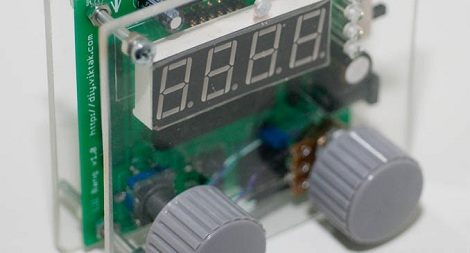
We’ve featured dozens of digital camera triggers over the years. Very rarely do we come across one as well designed as [Viktor]’s ‘lil bang sound trigger that snaps a picture whenever a microphone picks up a loud noise.
[Viktor]’s build is based around a PIC16F microcontroller with an LM386 amp connected to a microphone. On the front of the device, the right knob controls the sensitivity of the microphone and the left knob sets the delay between detection and the trigger.
The ‘lil bang trigger connects to the camera through an opto-isolated 3.5 mm jack that is compatible with all the fancy Canon and Nikon DSLRs. The delay between sound detection can be changed from 0 to 255 ms, allowing for precise control over a high-speed photography rig.
All this work comes after the light-activated trigger [Viktor] built for taking pictures of lightning. The sound-activated version wouldn’t work for lightning pics, but he thinks it could be useful for collision or explosion photographic studies. Check out the video of [Viktor]’s ‘lil Bang in action after the break.
[youtube=http://www.youtube.com/watch?v=zT6ORMj7yhc&w=470]















You can also do this on any canon SLR with magic lantern firmware
magiclantern.wikia.com/
So if you string together the light activated trigger and the sound trigger then you almost have a lightning distance computer.
Clap on [Clap, Clap], Clap off [Clap, Clap], Clap on, Clap off, the Clapper!
Neat. Comments: Why the heck would the camera output be on the bottom? All the connectors should be on one side. The green LED needs to go away. It serves no purpose since the lighting of the numeric display is obvious and the green LED is too bright. In fact, the numeric display could be used in place of all the LEDs. Finally, there is no indication that power is on, and this thing is going to need a battery supply to be useful in the field.
You can also buy a commercial unit..
http://www.nerotrigger.com
Where can I buy this unit